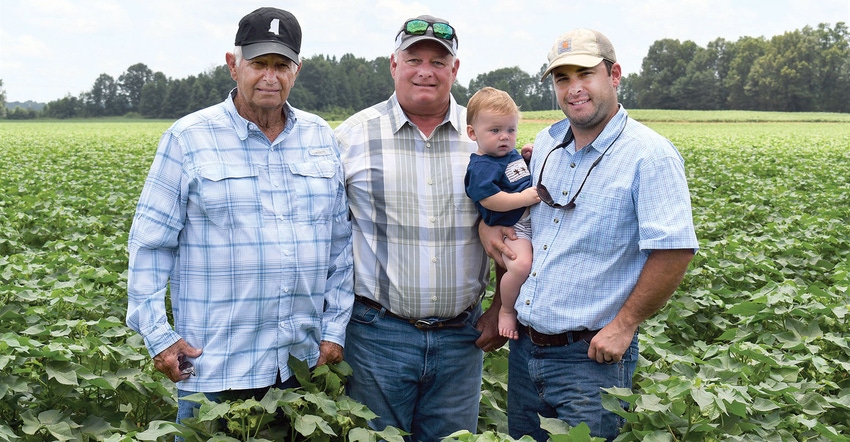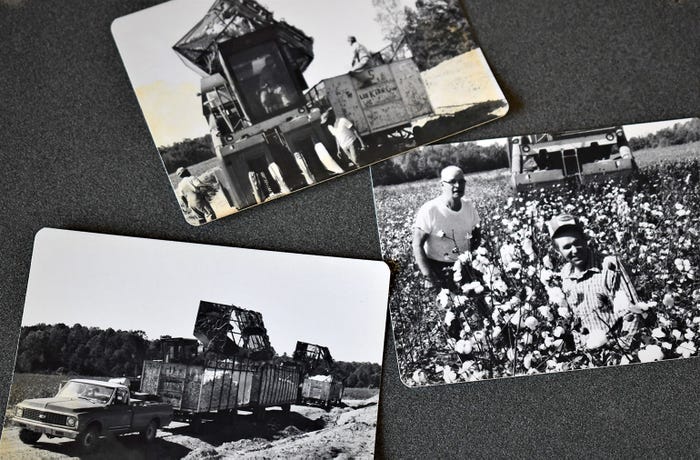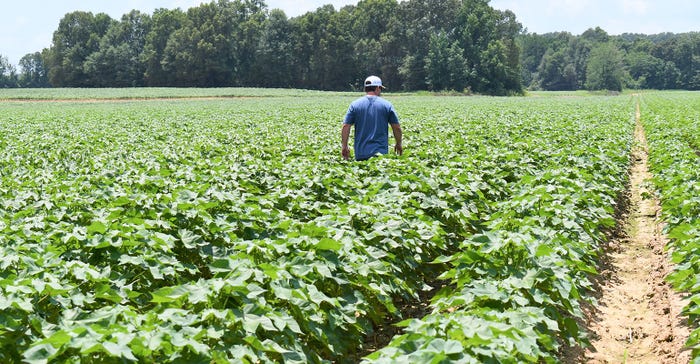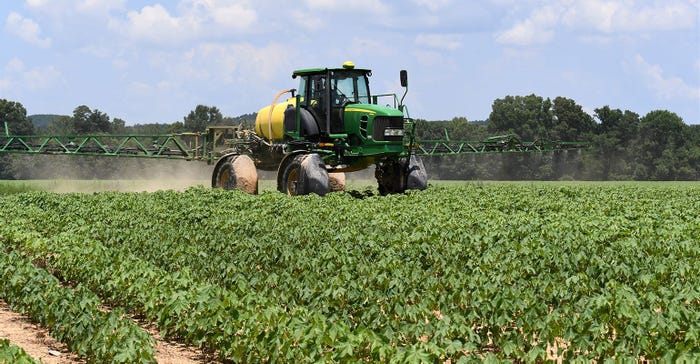
A lot can change in farming after four generations, and the Mills family has seen such changes first hand.
Kyle Mills is the youngest of the of Mills Farms enterprise, which is based out of Eskridge, a small community in central Mississippi. The Mills Farm depends on cotton, soybeans, corn, cattle, and custom harvesting.
Through the years, the farm has adopted new technology to improve efficiencies such as GPS, the round bale picker, and the new dicamba formulations.
“I got started in 2011 with my first crop, but I've been surrounded by farming my whole life,” said Mills, whose farming land consist of fields at Duck Hill, Elliott, and Gore Springs. “My great-grandfather, Mack Mills, started the farm. Then my grandfather, Thomas, got in the business and later my father, Brad. Also, my maternal grandfather, the late Charles Stoker, farmed as well, and his son, Steven Stoker, took over his farm after his father’s passing. Both have been great farmers and added to my knowledge of the profession.”
Mills said that the farm has come a long way from using a mule and plow setup and picking cotton by hand. Now, they have equipment like the round bale picker that wraps a bale in minutes.
“When my dad got started helping Pa-paw, they had a two-row cotton picker. We went from a two-row to a four-row and then a six-row,” he said.

Some things don’t change
Despite the advancement in technology, some things don’t change in farming, namely, the weather.
“2018 was a tough year for us with all of the rain,” he said. “We got 20 inches of rain at one time, and it rotted some of the cotton bolls. Everything is about timing. Last July about this time, we were one rain away from having an amazing crop and that one rain would have made our crops great, but we didn't get it. In August when we didn't need any rain, we got 14 inches. One or two small conditions can make you or break you.”
Due to excessive rain, the family couldn’t plant until later this year, but Mills said so far, the crops are looking good.
“We planted 400 acres of corn at the end of April, and we didn’t get our cotton planted until May. In June, we were able to plant soybeans. Our normal planting window is definitely off, so it will be a late crop this year,” he said.
Besides Kyle, his father, and grandfather working on the farm, they have two workers from South Africa as well as four truck drivers.
“We farm around 2,500 acres in cotton, corn, and soybeans,” he said. “My dad is the main one who farms the land, while I and my granddad mostly take care of our 200 cows.”

Custom harvesting
About five years ago, Kyle started doing custom harvesting.
“The first person I custom harvested for was Buddy Fancher. I then met Mr. Gary Archer who farms Racetrack Plantation, and from there, I got connected to other farmers in the Delta,” he said.
One thing that farmers have now that they didn’t have years earlier is GPS technology.
“It's amazing to my Pa-paw to get on a tractor in the field and press the GPS to drive itself,” he said.
Mills said that GPS technology is a huge money saver because of the built-in swath control which is used on application machines and planters to prevent overlapping when spraying or planting a field.
“Since it automatically cuts off when it gets to where you've already sprayed, you don’t waste chemicals or overspray the crops,” he explained. “The cotton picker is the same way. The sensor allows you to never miss anything.”
Many chemicals
Mills said what his father and grandfather dislike about farming now is all the different chemicals that are used.
“There are so many different chemical sprays to keep up with, so we rely on our close friend and chemical salesman, Bill Bailey, to help us. He and my dad have done business for over 31 years, and it’s great to have a salesman like Bill who cares about the farmers he does business with,” he said.
The farm has a John Deere CP690 cotton picker, which came out about five or six years ago.
“You used to need 10 or 15 people to help pick and bale cotton,” Mills said. “Now, we can go to the field by ourselves, and with one machine, we pick, bale, and wrap it. We can do about 90 to 100 acres a day.”
Some of the main challenges on the farm are combating pigweeds and deer. Although the Mills have tried several measures to stop the deer, Kyle said that they have only managed to slow them down, not get rid of them altogether. For pigweed, they use the new dicamba formulations.
“No chemical seemed to be able to kill a pigweed, but when they come out with dicamba, it is the only thing that we’ve sprayed that can kill our pigweeds,” he said. “We’ve been able to maintain our land by spraying every couple of years. We keep hitting them hard to try to keep them at bay.”

Crop rotation
Mills said that rotating crops is the key to farming.
“Because of high commodity prices in the last couple of years, we had no choice but to keep planting cotton. This year we were finally able to do some rotations of about 400 acres of corn to put some organic matter back in the ground. The prices tell you what you can do as far as the rotation goes, and since we are non-irrigated, we aren’t able to rotate as much as we would like,” he said.
Mills emphasized that he wouldn’t be where he is today if it wasn’t for the support of his father and grandfather.
“Most people don't realize how tough farming is,” Mills said. “It has been good to our family, but as my dad always says, you have to save for a rainy year.”
About the Author(s)
You May Also Like




